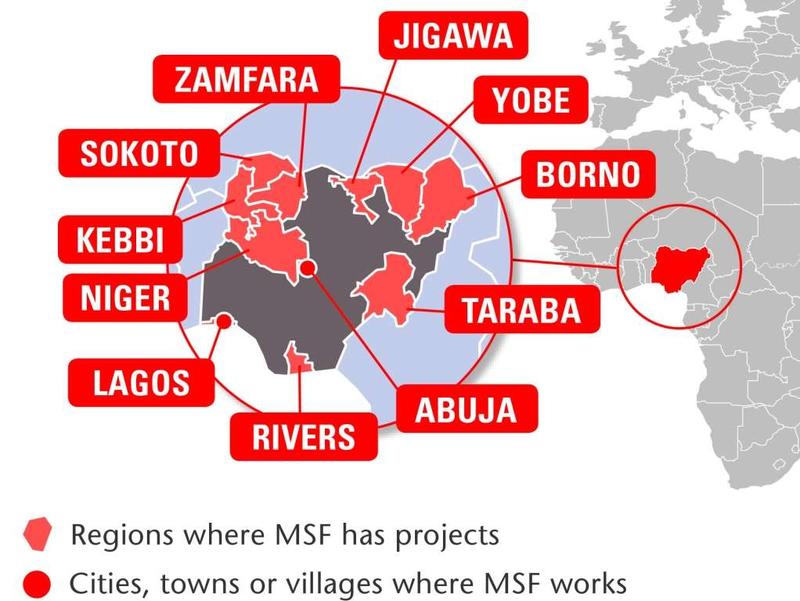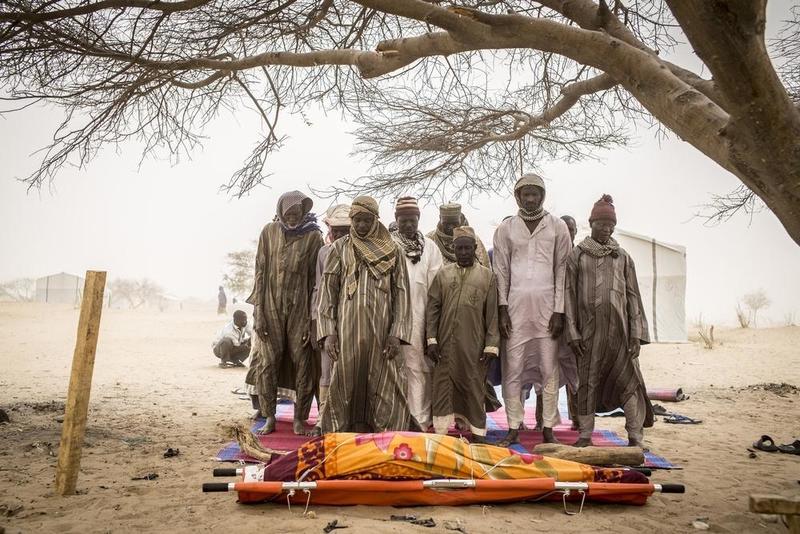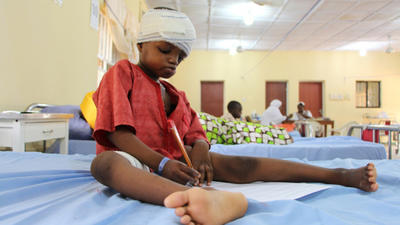With an estimated population of 183.5 million, Nigeria is the most populous country in Africa and the seventh most populous country in the world.

Nigeria also has one of the fastest growing economies in the world. Petroleum and oil resources play a large role in the Nigerian economy. However, the security situation deteriorated in many areas of Nigeria in 2014. Violence and displacement took their toll on people’s health and reduced their access to medical services.
Médecins Sans Frontières/Doctors Without Borders (MSF) first worked in Nigeria in 1971. Our response to the Biafra conflict and ensuing famine was, in fact, the first official MSF mission after our founding.
[[Country-Facts]]
Borno crisis
An extremely critical health situation is unfolding in Borno State, in northeast Nigeria. At least 500,000 people are either displaced or cut off in enclaves outside the state capital of Maiduguri and are in urgent need of food, medical care, drinking water and shelter.
“People are gathered, isolated and cut off in a half-destroyed town, and are totally dependent on external assistance, which is cruelly lacking. If we don’t manage quickly to provide them with food, water and urgent medical supplies, malnutrition and disease will continue to wreak havoc.”
Assessments by MSF, UN agencies and the Nigerian authorities have shown an extremely serious situation. In Bama, mortality rates exceed the emergency threshold and 15 percent of children are suffering from severe acute malnutrition.
Efforts are being mobilised but a massive relief operation is required to respond to this crisis, particularly for those who are in remote or cut-off areas.
Latest news on Borno Crisis
- Nigeria: "We are too scared to go back"
- Nigeria: MSF warns of large-scale humanitarian disaster
- Nigeria: Health disaster in Borno State with high rates of malnutrition
MSF’s work in Nigeria: 2015
Insecurity and suicide attacks by insurgents led to further displacement, increasing the need for medical and humanitarian aid in Nigeria in 2015.[[Article-CTA]]
We have been providing healthcare to people displaced by violence, as well the host community in and around Maiduguri, since mid-2014. In 2015, around 10,000 outpatient consultations were carried out across four sites (two in the camps, two in the community) each month.
Child health
MSF has been working in Zamfara state since 2010 following an outbreak of lead poisoning in children. This year, the team continued to monitor lead levels and fewer than 10 percent tested needed chelation treatment to remove it from their bodies. The Zamfara project has now evolved to provide healthcare to children under the age of five in five villages, focusing on malaria, upper and lower respiratory tract infections, malnutrition and diarrhoea. Overall, more than 19,300 consultations were carried out and 3,200 children were admitted.
- We began a new programme in Niger state in June to address lead exposure in children
- MSF advocacy efforts resulted in a government decision to remediate lead from two villages.
- MSF launched a new programme In Kebbi state consisting of three mobile clinics and a health centre that offers inpatient and outpatient services for children under 15. A malaria clinic opened in August and over 4,000 patients had been treated for malaria by the end of the year.
Reconstructive surgery for children
In August, a surgical team made its first visit to Sokoto to operate on 25 children suffering from noma (a facial gangrene infection that usually affects children under the age of six), cleft palate, cleft lip and other facial disfigurements.
MSF ensured pre- and post-operative care, including nutritional and psychosocial support for families, which helped reassure parents about their children undergoing surgery and also enabled the children – who are often shunned because of the disease – gain social skills. Around 450 individual and group mental health sessions were undertaken.
Sexual and reproductive healthcare
A new programme for victims of sexual and gender-based violence started in June in Port Harcourt, and following an awareness campaign delivered in schools, health clinics and the media in September, monthly attendance at the clinic doubled from around 35 to 70 patients.
The well-established Jahun emergency obstetrics programme at the government hospital in Jigawa state admitted an average of 900 patients per month, of whom around 100 needed intensive care. Staff cared for 116 babies in the neonatal unit each month. During the year, surgeons carried out approximately 2,400 interventions, including 300 for obstetric fistula. About 60 percent of patients were aged between 15 and 19.

Responding to emergencies
An early warning surveillance system based in Sokoto facilitates rapid response to emergencies. In 2015, an outbreak of meningitis led to a mass vaccination campaign that reached 229,500 people, and over 6,300 people received treatment for the disease.
An Abuja-based emergency team ensured health facilities were prepared for possible post-election violence by training medical staff on mass casualty response and assessing facilities. The team also responded to an outbreak of cholera in Maiduguri, where more than 1,700 patients were treated.
Find out more in our 2015 International Activity Report




